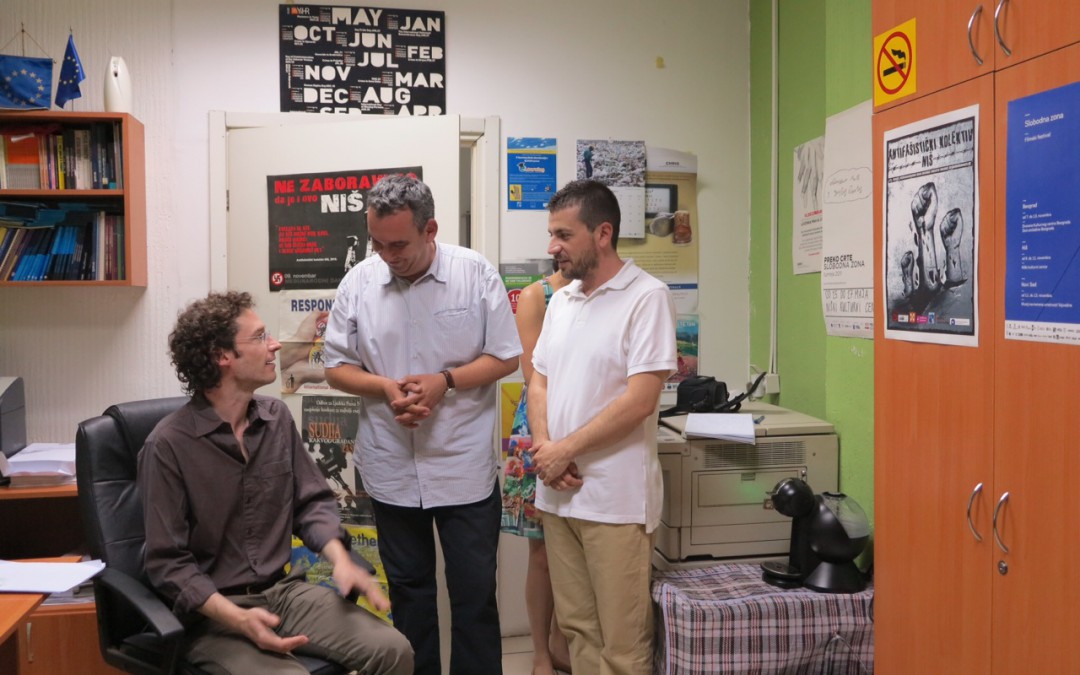One of the primary activities of the Triple A project is to mentor those pilots that are in receipt of sub funding through the Triple A pilot programme. The overall objective in offering mentoring is to advise on the implementation of the funding and to offer support and practical help to the pilots. Going forward it is planned to include all participants in Triple A to forge a Network of advice organisations and intelligence gathering on what organisations are providing on the ground is an essential component of establishing the network.
In July 2014 Anthony Valke (ECAS) and I visited two organisations in Serbia, the Committee for Human Rights in Serbia (CHRIS) Network and Zajedno Zajedno (Together Together).
These two organisations are at different ends of the development spectrum with CHRIS being a long established network covering wide geographical regions and Together Together offering services to a specific client group, mainly women experiencing difficulties with employment and or domestic abuse. We spent two days in Nis meeting with Dragon Djordjevic Co-ordinator of CHRIS Network and his team and a further day in Belgrade with Snejzana Milcic, President of Together Together and other members of the organisation.
Both organisations are using Triple A funds to develop their existing services further by reaching out to those people that do not currently access advice services in great numbers. In the case of CHRIS specific services to those people suffering a disability is their main target group, whilst Together Together are keen to further develop their advocacy service.
We were impressed by the work being done and the range of services on offer, CHRIS Network provides free rights based legal advice services to citizens in 5 regional areas in Serbia, Nis, Valjevo, Novi Pazar, Negotin, and Bujanovac. The Network has been providing services for 17 years and is well connected and known as a human rights organisation in Serbia. The individual offices are spread out covering significantly large regions mainly positioned in border areas (with the exception of the ‘head’ office in Nis. Although there is no physical presence in Belgrade the organisation is represented at various meetings and conferences with other Non Governmental Organisations (NGOs) in Serbia.
Together Together founded in 2006 is based mainly in Belgrade also provides activities in Vojvodina. As an organisation Together Together has implemented 50 projects during its lifetime covering a range of actions relating to internally displaced persons, women’s rights, children’s rights, and reproductive and educational rights. Together Together’s pilot programme involves information and advice to women facing discrimination, including women with disabilities, Roma women, lone mothers, and older women.
We were informed during the visit that the Serbian government is still working on draft Legal Aid to provide a more comprehensive legal framework for the delivery of free legal aid. During our visit concerns were expressed that the new draft was crafted too restrictively in particular, as regards which groups would be entitled to provide free legal aid. This is a worrying direction for the Serbian Government to be taking as it could potentially cut off the NGO sector for example, therefore limiting access for the people who need legal aid and are unsure of seeking help from private advocates.
We had fun during the visit meeting people involved who were extremely hospitable and looked after us. I learned a lot about Serbia (from Sasha who patiently drove us from Belgrade to Nis and back again) and now know what a Cavana is and how to identify whether it is a good or a bad one and to enjoy Turkish coffee. Katarina Golubovic (YUCOM) who organised everything and to whom we are very grateful for being so efficient guided us throughout, and Anthony Valke who contributed to this article.
Noeleen Adams, Law Centres Network

